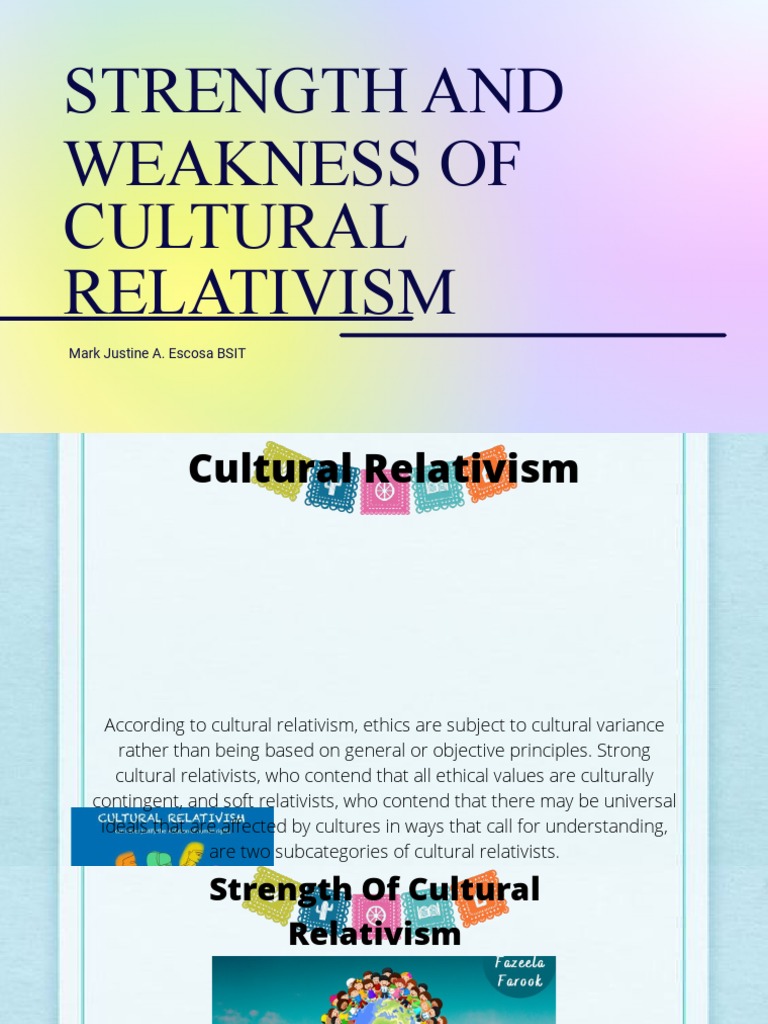The concept of cultural relativism is an intriguing framework that warrants exploration, particularly with respect to its potential strengths. It encourages individuals and societies to engage with diverse cultural practices and beliefs without imposing their own values as benchmarks. This politico-philosophical stance champions the idea that what is deemed “normal” or “ethical” varies dramatically across different cultures, urging us to reconsider our entrenched perspectives. Herein lies a promise of transformation—cultural relativism invites a paradigm shift that can enrich our understanding of the world.
@Cultural relativism asserts that norms and values are context-bound, and what may be perceived as a virtue in one society could be considered a vice in another. This leads to several potential strengths, particularly in fostering empathy, establishing cross-cultural dialogues, and heightening global awareness of cultural diversity.
First, cultural relativism fosters empathy by encouraging individuals to step into the shoes of others. In a world rife with conflict often fueled by misunderstanding and intolerance, such perspective-taking can be transformative. When we endeavor to comprehend a culture’s practices without prejudice, we cultivate an atmosphere of respect. Cultural relativism dismantles xenophobic sentiments, urging individuals to engage with difference rather than react with animosity. The invitation to see the world through another’s lens may reduce conflict and facilitate coexistence, making empathy one of the most significant strengths of cultural relativism.
Moreover, cultural relativism promotes the establishment of cross-cultural dialogues. In our increasingly globalized society, conversations between cultures are essential. These dialogues can lead to innovative solutions for today’s pressing issues ranging from social justice to environmental sustainability. When individuals appreciate the nuances of differing cultural perspectives, collaborative efforts can emerge. Consider environmental activism—it thrives on understanding varied cultural values surrounding nature. Indigenous practices, for instance, can offer insight into sustainable methods that prioritize ecological balance. By valuing these perspectives through a culturally relative lens, solutions become more holistic, integrating insights from multiple traditions.
Additionally, the strength of cultural relativism lies in its power to heighten awareness of cultural diversity. In an age dominated by rapid globalization, it’s easy to overlook the unique practices and traditions that characterize various communities. Cultural relativism acts as a reminder that there is not a singular way to be human or to live life. By appreciating the richness of diverse cultures, societies can become more inclusive and understanding. This not only enriches individuals’ lives, but it also allows for the cross-pollination of ideas that can lead to societal advancements.
However, one might ponder whether cultural relativism presents risks. Critics argue that it can lead to moral complacency, permitting harmful practices under the guise of cultural preservation. While this concern is valid, it is crucial to engage with the distinction between cultural relativism as a descriptive tool and its prescriptive implications. Cultural relativism alone does not endorse harmful practices; rather, it serves as a lens through which to appreciate cultural differences. This distinction clarifies that addressing human rights violations is not antithetical to understanding other cultures. By applying a culturally relative approach, advocates can frame their critiques in ways that respect the cultural context while promoting universal human dignity.
Moreover, the applicability of cultural relativism extends to the field of international relations. In an epoch where diplomatic ties are often strained, employing an understanding of cultural practices can lead to more effective negotiations and partnerships. For example, understanding a culture’s value system can significantly impact business dealings, diplomatic discussions, and collaborative efforts. When leaders are cognizant of cultural nuances, they can navigate complex terrains with greater efficacy. This relational acumen enabled by cultural relativism can bolster global cooperation, by emphasizing shared objectives rather than discordant differences.
In education, cultural relativism serves as a vital pedagogical tool. By incorporating diverse cultural perspectives into curricula, students can cultivate critical thinking skills and a nuanced worldview. Real-world problems often require multifaceted solutions, and exposure to various cultural frameworks can spur innovative thinking. Rather than presenting a monolithic narrative, an educational approach steeped in cultural relativism prepares students to engage thoughtfully with a globalized world. This awareness is indispensable, shaping future leaders who are empathetic, informed, and equipped to tackle collective challenges.
Finally, it is essential to recognize how cultural relativism can inspire introspection and curiosity. When we are faced with practices outside our own experiences, it invariably provokes questions. Why do others do things this way? What beliefs underpin their actions? This curiosity not only enriches our understanding of the human experience but also drives personal growth. As we grapple with these questions, we are encouraged to reflect upon our own cultural narratives and assumptions, promoting a lifelong journey of learning and discovery.
In conclusion, the strengths of cultural relativism extend far beyond mere acceptance of differences; they invite a transformation of perspectives, cultivate empathy, enhance global dialogue, and stimulate curiosity. In a world fraught with divisions, embracing cultural relativism provides a pathway toward greater unity and understanding. It is an approach that challenges us to confront our biases, fostering a more harmonious, cohesive society—one that recognizes the beauty of diversity while seeking common ground. The journey of embracing cultural relativism is undoubtedly intricate but promises to cultivate a rich tapestry of understanding that benefits all of humanity.
